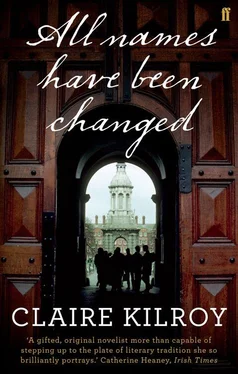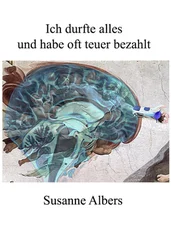Claire Kilroy - All Names Have Been Changed
Здесь есть возможность читать онлайн «Claire Kilroy - All Names Have Been Changed» весь текст электронной книги совершенно бесплатно (целиком полную версию без сокращений). В некоторых случаях можно слушать аудио, скачать через торрент в формате fb2 и присутствует краткое содержание. Год выпуска: 2010, Издательство: Faber & Faber, Жанр: Современная проза, на английском языке. Описание произведения, (предисловие) а так же отзывы посетителей доступны на портале библиотеки ЛибКат.
- Название:All Names Have Been Changed
- Автор:
- Издательство:Faber & Faber
- Жанр:
- Год:2010
- ISBN:нет данных
- Рейтинг книги:5 / 5. Голосов: 1
-
Избранное:Добавить в избранное
- Отзывы:
-
Ваша оценка:
- 100
- 1
- 2
- 3
- 4
- 5
All Names Have Been Changed: краткое содержание, описание и аннотация
Предлагаем к чтению аннотацию, описание, краткое содержание или предисловие (зависит от того, что написал сам автор книги «All Names Have Been Changed»). Если вы не нашли необходимую информацию о книге — напишите в комментариях, мы постараемся отыскать её.
All Names Have Been Changed — читать онлайн бесплатно полную книгу (весь текст) целиком
Ниже представлен текст книги, разбитый по страницам. Система сохранения места последней прочитанной страницы, позволяет с удобством читать онлайн бесплатно книгу «All Names Have Been Changed», без необходимости каждый раз заново искать на чём Вы остановились. Поставьте закладку, и сможете в любой момент перейти на страницу, на которой закончили чтение.
Интервал:
Закладка:
*
Aisling was sitting alone at the bottom of the staircase in House Eight, swathed in her widow’s weeds. I clocked her before she clocked me. Sometimes it was hard not to stare at her. Her head hung low between her knees, looking too large, too burdensome, for the pale stem of her neck, which was exposed as if for a beheading. A leather cord was knotted at her nape. Aisling hung weird artefacts around her neck — not the skulls and horns the regular Goths purchased from the wind-racked stalls on O’Connell Bridge but antique medical instruments, phials of dark viscid liquid, little brass dial things saying Yes or No, mummified bits of Christ knows what. Where did she even find them? They were not from this century. It was an eerie world she went home to, that contained such oddities strewn throughout it, and her harvesting them like toadstools in a forest. There seemed no end to her supply of peculiarities. Amulets, I suppose you might call them. The manner with which she constantly toyed with them, turning them over and over in her left hand as if seeking their counsel, her eczematous fingers spinning like the legs of a spider, imbued them with a sentient status.
Her long hair had pooled between her Doc Martened feet on the linoleum floor, so black it looked synthetic. She often presented herself in alarming configurations, her bones a bundle of sticks she’d tossed into the air and allowed to collapse into a pile any which way. This was done unwittingly, as far as I could tell. It was simply her nature, the casual disregard with which she treated herself. She was more careless with her own person than even Glynn.
You would think we’d have acclimatised to her endless rag-doll positions, the broken-winged bird shapes, but, if anything, they grew progressively more upsetting. Normal girls didn’t sit like that, as if a joint were dislocated, a central sinew severed. The aura of calamity surrounding Aisling didn’t drop its guard for a second. I longed to return to my thoughts of Guinevere. They were a warm bed on a cold morning.
Aisling’s head lashed back when I touched the door handle, as if it were no door handle at all but one of her drifting tentacles. I, for my part, recoiled as if stung. The two of us looked at each other in momentary alarm, but she relaxed when she saw it was only me. Who had she been expecting?
She stood up, slinging her canvas army bag over her shoulder, and blocked my entrance. ‘What’s going on?’ I asked when she motioned for me to turn around and go back out. I was forever having to ask them what was happening. They were forever having to interrupt themselves to explain. Aisling narrowed her eyes at the sky, deciphering more there than the weather. I foolishly glanced up too, as if warplanes might crest the horizon.
‘It’s Glynn,’ she said. ‘He’s holed up in his office.’
We set off for the Arts Block, the miniature magnifying glass swinging from her neck warping the matter on the other side, an evil eye. It was a bitterly cold afternoon, even for early February. Frost coated the tracts of cobbles still trapped in the shade. Aisling wasn’t dressed for the cold and was soon hunched up against it like a greyhound, all shivering spine.
She offered me an unfiltered Major, and selected one for herself with a suit-yourself shrug when I declined. I couldn’t bear to watch her inhale those builders’ smokes into her tattered lungs. The orangey-yellow nicotine stains on her fingers were a source of pride to her, for some reason. She had brandished them at us one night in the pub, holding them out to be admired like an engagement ring, as if she couldn’t quite believe her good fortune and wanted to share it with us, though they were the colour of old men’s feet. She gave one of her terrible racking coughs, hoarse as the cry of a hooded crow, and so raw that I felt the pain myself. She pressed her palm against her thorax in an attempt to subdue it. This stratagem didn’t work.
The other three were already waiting when we rounded the corner onto the corridor of the English Department, stationed in manneristic postures of stylised concern, a bible scene. Guinevere had somehow contrived to get there ahead of me. Aisling left my side, and they made way for her. The light flooding through the window behind them picked out the folds of their garments, the contours of their bodies. Had they any conception of how striking they looked when placed together in such a formal arrangement, staggered like peaks in a mountain range? They took my breath away. It was to do with their silence as much as anything else on that occasion.
All that was missing from the composition was the big man himself, towards whom the four women were inclined so that it was all about him, and no one but him, though he was not present. You had to give Glynn his due.
‘What’s going on?’ I asked again, my voice an uproar in the church-quiet corridor. They shushed me by waving their hands and putting fingers to their lips, scared I might disturb Glynn, whatever he was up to. He should’ve been in the workshop with us. They seemed to think he wouldn’t suspect they were there, listening at his door in their default state of rapture, but Glynn always knew where to find his audience.
I hesitated before approaching. There were times, as I went stumbling through their doll’s house, knocking things over in my clumsy wake, smashing their bone china and matchstick furniture, when it seemed I was too big for them. They didn’t know what to do with me. I could read it on their faces, particularly Faye’s, who was smiling that tolerant, sympathetic smile of hers that I had no liking for when it was directed at me. She could take her benevolence elsewhere. Guinevere was strange and separate once more. I knew that if I took her hand and tried to lead her away from the pack, it would not work this time.
Faye beckoned me over to listen at Glynn’s door. I pressed my ear against it. He could be heard muttering away to himself inside, low-level malcontent grumblings. ‘It’s been going on for hours,’ Faye whispered. She had been about to knock on his door that morning when she’d overheard him. ‘When I eventually did knock, he roared at me. “Feck off, I’m working,” he shouted. We think he’s finally writing the new novel.’ Now that the long evenings are upon me once again,
‘Jesus,’ I said, and the four of them nodded. The last we’d seen of Glynn, he could barely walk. Now this.
‘Blake!’ he suddenly exclaimed. We looked at each other in delight, as if a baby in the womb had just kicked. Even Antonia looked intrigued.
It had long been Glynn’s habit to talk to himself. That was nothing new. He told a reporter once that he was indeed aware of it but made not the slightest effort to censor himself, since he regarded it as a component of the writing process externalised. Glynn was full of fighting talk in interview situations, tending to interpret questions about the creative act as attacks upon it. Sometimes he was right. These occasional unintentional articulations on his part, he informed the journalist, were not the first sign of madness, but rather evidence of what he called his ‘imaginative fertility’, but which another well-known Irish author of similar vintage rechristened his ‘imaginary fertility’. In fairness, he’d been asking for that one.
Fragments of Glynn’s internal monologue regularly escaped his lips when he thought himself alone, or had forgotten we were still there, or knew we were still there but didn’t care, or was trying to impress us with his scope of reference — by us, I mean the girls. So many ideas clamoured for attention in his brain that he can be forgiven if the excess spurted out, like lava. This, however, wasn’t thinking aloud so much as arguing. ‘Blake!’ he insisted once more, in a tone of high exasperation, as if his own company were being wilfully obstinate, which it probably was. We could just see him behind that door, amongst his books and accolades, pacing the length of the room which could never contain him, gesticulating impatiently at imagined opponents. Something was heard to fall over.
Читать дальшеИнтервал:
Закладка:
Похожие книги на «All Names Have Been Changed»
Представляем Вашему вниманию похожие книги на «All Names Have Been Changed» списком для выбора. Мы отобрали схожую по названию и смыслу литературу в надежде предоставить читателям больше вариантов отыскать новые, интересные, ещё непрочитанные произведения.
Обсуждение, отзывы о книге «All Names Have Been Changed» и просто собственные мнения читателей. Оставьте ваши комментарии, напишите, что Вы думаете о произведении, его смысле или главных героях. Укажите что конкретно понравилось, а что нет, и почему Вы так считаете.












